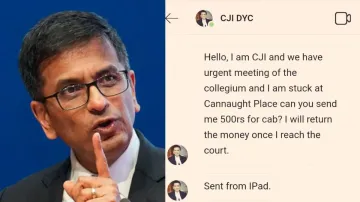In the digital age, scams have become increasingly prevalent, with fraudsters employing various tactics to deceive individuals. One of the latest schemes involves a scammer impersonating Chief Justice of India (CJI) DY Chandrachud to solicit money for a cab ride. An X user received a message from someone pretending to be the Chief Justice. According to a screenshot that has gone viral, the impersonator claimed to be CJI Chandrachud and said he was stranded in Connaught Place (CP) and urgently needed Rs 500 for transportation to attend an important collegium meeting in the Supreme Court.
"Hello, I am CJI and we have urgent meeting of the collegium and I am stuck at Cannaught Place can you send me 500rs for cab? I will return the money once I reach the court (sic)," the fraudster wrote. The message ended with 'sent from iPad. In response to the fraudulent incident, the Supreme Court, acting on the instructions of Chief Justice DY Chandrachud, filed a formal complaint with the cyber crime cell on August 27. The cyber crime cell is now investigating the matter to identify and apprehend the perpetrator behind this scam.
Cyber fraud and scams have become increasingly common, with scammers continuously devising new methods to deceive unsuspecting individuals. One such recent method is the "Scratch Card Scam," which has left many people vulnerable to significant financial loss.
How does the ‘Scratch Card Scam’ work?
Recently, a new form of cyber fraud emerged, targeting individuals through scratch cards. In these scams, victims receive a scratch card through a courier service, which promises the chance to win a substantial sum of money. Once the card has been scratched, the recipient is informed that they have won a large prize (mostly money), which often amounts to lakhs (in Indian currency). The victim is then instructed to call a phone number provided on the card to claim their winnings.
This is where the scam begins. Upon calling the number, the victim is told that to receive the prize money, they must first pay a processing fee and taxes. Trusting this information, the victim follows the instructions given by the scammer, which typically involves providing personal details and making payments. As a result, the victim unknowingly gives the scammer access to their bank account, leading to significant financial losses.
ALSO READ: Scratch Card Scam: What is it and how to protect your bank account from such cyber crime?
Latest India News
